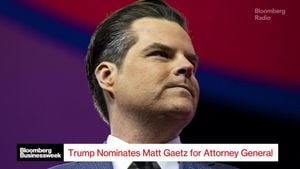India's political atmosphere has been watching several pivotal changes as government reform initiatives continue to evolve. Among the latest significant developments is Prime Minister Narendra Modi's announcement during the inauguration of various infrastructure projects aimed at enhancing healthcare, especially targeting states like Bihar, which are noted for their developmental challenges.
On November 13, PM Modi laid the foundation for the All India Institute of Medical Sciences (AIIMS) in Darbhanga, Bihar. This is one of the key pieces of his broader strategy to bolster the healthcare system across India. Modi praised Chief Minister Nitish Kumar's leadership, commending his efforts to progress away from what he referred to as the "jungle raj" era. The Prime Minister emphasized the government's comprehensive healthcare approach, focusing on disease prevention and early diagnosis, which includes setting up over 1.5 lakh Ayushman Arogya Mandirs across the country to provide early detection services.
"The current generation is fortunate to witness this transformation," Modi expressed, as he highlighted the need for healthcare reform as part of India’s larger plan to evolve toward becoming ‘Vikshit Bharat’ (Developed India). Modi asserted his administration's unwavering commitment to programs directed at public health, stating, "We have extended the Ayushman Bharat scheme to all senior citizens above 70 years, offering free treatments irrespective of family incomes." This statement alone signifies the government’s focus on making healthcare more inclusive and accessible.
While addressing the crowd, Modi also touched on the recurrent flooding issues faced by North Bihar, especially the Kosi and Mithila regions. He assured attendees of the government’s commitment to resilience-building efforts against annual floods. The Prime Minister's mention of comprehensive plans already delineated within the yearly budget demonstrates the government's proactive stance on such environmental challenges.
Beyond health and environmental issues, the backdrop of Modi's remarks aligns with the government’s endeavors to redefine political narratives, particularly relating to the Muslim community. The Waqf (Amendment) Bill, which aims to amend the existing Waqf Act of 1995, is emblematic of this shift. The bill proposes increased state control over waqf properties, which has raised alarms among various communities, inviting critiques from political leaders worldwide.
Critics argue this bill might undermine Muslim rights and alter longstanding traditions associated with waqf properties, which include mosques and various forms of charitable land. The proposed plan includes non-Muslim members within waqf property management, igniting fears about loss of community control. During discussions within parliamentary settings, numerous amendments were proposed amid extensive protests aimed at safeguarding the interests of Muslims. Notably, over five crore emails opposing the bill were reportedly sent to the Joint Parliamentary Committee assigned to examine it.
Opponents of this move, particularly representatives from the All India Muslim Personal Law Board, have argued passionately about the potential repercussions. Accusations of political parties intending to exploit Islamic institutions for broader political gains are surfacing. Many perceive these developments as part of the overarching agenda from the ruling party to redefine minority rights and portray their governance as one of inclusivity. Nadia Abou El-Haj, who shared insights on the sociopolitical impacts of community property laws, stated, "Such reforms must be handled delicately to avoid marginalizing sections of society which have historically been underrepresented."
Modi's government faces mounting pressures to justify its intentions behind these legislative changes. With leaders from multiple political spheres — from prominent opposition figure Rahul Gandhi to others across party lines — reminding citizens of the importance of maintaining equilibrium between reform and rights. The reflection of historical injustices and policies leading to marginalization prompts questions about the integrity of recent legislative efforts.
The complexity of India’s political dynamics reveals itself through moments of unity and division. For example, during the commemoration of Jawaharlal Nehru's 135th birthday anniversary, leaders across the political spectrum paid tribute to India's first Prime Minister. PM Modi spoke of Nehru's commitment to development and his legacy, showcasing the shared values of democracy, progressive thought, and unity. Rahul Gandhi referred to Nehru as the "Jawahar of India," upholding ideals of inclusivity, which resonate with his calls for equal representation.
The recent practice of appropriations and tributes reflects the reality of contentious political philosophy but also suggests latent corridors for collaboration. Various political figures invoked Nehru's vision for India as they articulated contrasting viewpoints on contemporary issues, showcasing historical reverence even amid fierce political differences.
Yet, deeply entrenched are the societal divides manifesting through these law reforms and political utterances. Many members of the Muslim community view the recent developments — especially concerning waqf property management — as indicative of larger narratives aimed at disenfranchisement rather than genuine inclusivity. This perception calls for dialogues emphasizing cooperation on socio-political fronts rather than alienation.
Opposition leaders and community advocates push back against what they see as governmental overreach. These tensions encapsulate the essence of India’s current climate, where reform initiatives often grapple with the necessity of justice for historically marginalized groups. While Modi insists progress takes precedence, the reaction is often underscored by reminders of past experiences and present apprehensions of community sentiment being disregarded.
Finally, as India's political climate continues to evolve, the interplay of reform, rights, and responsibilities remains delicate. Whether Prime Minister Modi's promises translate to prosperous outcomes or reinforce disenfranchisement will significantly impact not only the political spectrum but the heart of Indian society as it strives to navigate through complex waters toward unity.



